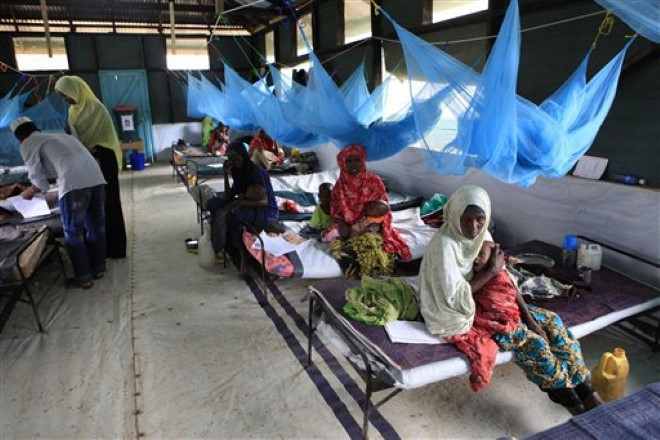
Wednesday, August 17, 2016
By Gillian Barth

Somali parents care for their young children as they are treated for malnutrition at a Doctors Without Borders (Medecins Sans Frontieres) hospital in Dagahaley Camp, Dadaab, Kenya, July 11, 2011. (AP Photo/Rebecca Blackwell, File)
It has been nearly a year since a tragic photo sparked renewed interest in a refugee crisis. The past 12 months also saw shifting weather patterns create serious drought and hunger, as persistent inequality ensured too many women and girls continued to suffer the loss of their potential.
Meanwhile, new international frameworks — the 2030 Agenda for Sustainable Development, the Paris Climate Change Agreement and the Sendai Framework for Disaster Risk Reduction — together provided motivation to develop better ways to fight global poverty. In such a context of both crisis and concord, the Government of Canada’s recent international assistance consultations couldn’t have been more timely.
It has been more than a decade since Canada last conducted a broad review of its policy and funding framework. CARE Canada was pleased to join our civil society colleagues and share our experiences to help contribute to these important discussions.
The review landed at a time of tremendous change, marked by significant shifts in how we view the causes of poverty, inequality and instability around the world. This movement isn’t isolated to those nations with the lowest GDP, either; today, 73 per cent of the world’s poor now live in middle-income countries.
Poverty and instability are primarily shaped by unequal power relations. What’s needed is a new approach to reaching the world’s most vulnerable people, one centred on efforts to address and reverse such imbalances.
By refocusing efforts on fostering a more equitable distribution of resources and opportunities — between women and men, between power-holders and marginalized communities, and between countries — Canada can lead new efforts to create more durable development outcomes, while helping build a more stable and prosperous world.
Addressing interconnected global challenges requires a joint approach. The Government of Canada should look to new ways to ensure coherent policy and funding between the offices responsible for foreign affairs, international trade, international development, humanitarian assistance, defence, the environment, climate change and health.
The links between domestic and international climate change and sustainable development issues, stability and security, clean and inclusive growth, resilience, nutrition and health, and agriculture and food security underscore the fact that international public policy increasingly requires approaches to be coordinated between departments and their respective stakeholder groups.
The government’s desire to do more to tackle these challenges amid prevailing budgetary constraints only reinforces this need.
Development experience has shown that significant change is often incremental. The achievement of effective and long-lasting international assistance outcomes requires interventions that shift deeply-held beliefs.
Canada can increase its impact by investing in programming that lasts a decade or longer. This can ensure national governments buy into both activities and results, the private sector and other actors understand their role in supporting objectives, and people of all genders have the time to discover for themselves what it means to live in a more equal society.
Such approaches take time but unquestionably yield results. Longer-term programming allows development partners to achieve more clear demonstrations of real change.
This certainly would be true should the Canadian government attempt to shift the imbalance between women and men. Gender and power relations are delicately entwined with our identities as individuals and as societies. Achieving true equality for all genders requires changing long-standing social norms, one person at a time.
In recent years, Canada’s international assistance often has treated women as victims, as mothers (or potential mothers), or as passive recipients of assistance. The adoption of a feminist foreign policy requires that international assistance treat women not simply as beneficiaries, but as true agents of change.
This involves enacting a rights-based approach that seeks to address the root causes of problems, and transform unequal structures and systems. New measures must go beyond service delivery and be aimed at strengthening women’s autonomy and empowerment. This includes support for women’s rights organizations’ to influence policy reform and implementation, transform gender norms and stereotypes, and foster changes in attitudes and behaviours.
On first read, such ambitions may appear lofty, but they are based on lessons learned from successes Canada has already achieved through years of development and humanitarian support. CARE Canada participated in more than a dozen consultation meetings and, broadly, heard many of the same messages from experts across the sector.
The world is changing — new approaches to international assistance are required. After international summits, domestic reviews and consultations, the question now remains: How will Canada translate the expertise so carefully and thoughtfully gathered into action?